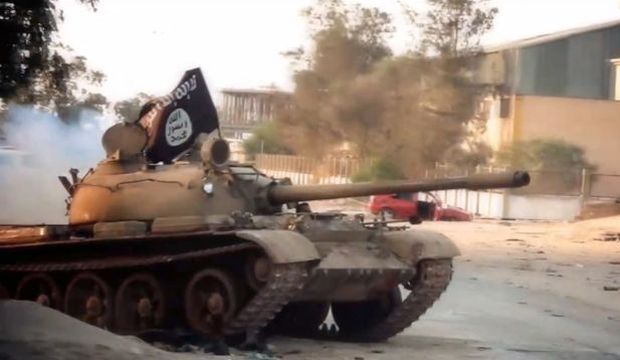
An image taken from a video made available on October 9, 2014, allegedly shows a tank, belonging to the Ansar Al-Shari’a militant group, flying the trademark jihadist flag during a battle in the Libyan city of Benghazi. (AFP Photo)
Cairo, Asharq Al-Awsat—The Libyan army has achieved successive “military victories” against extremists in the eastern city of Benghazi this week, Libyan General Staff spokesman Col. Ahmed Abu Zeid Al-Mismari said following the announcement of an alliance between the country’s elected Tobruk parliament and renegade Gen. Khalifa Haftar.
In comments to Asharq Al-Awsat on Monday, the Libyan army spokesman said: “There is slow progress due to the large population of the city. The army does not want to target houses or public property or the general public in Benghazi. We are only seeking to destroy the military capability of these foreign extremists, so our plan is based on achieving slow but steady progress.”
Mismari, who is the official spokesman of the Libyan army affiliated to the country’s elected parliament based out of Tobruk, described the situation in the city of Benghazi as “calm” but warned that the retreating Ansar Al-Shari’a and Shura Council of Benghazi Revolutionaries fighters were still well-armed and could attempt to launch a counter-attack.
The Libyan army spokesman’s comments were issued after the Tobruk parliament announced a formal alliance with Gen. Khalifa Haftar and his Libyan National Army, which launched a new offensive against Islamist militants in Benghazi last week after a previous offensive had been thwarted.
The Libyan parliament announced its backing of Haftar’s Operation Dignity in Benghazi on Sunday, placing the renegade general’s forces under the authority of the Libyan Army.
“Operation Dignity is leading officers and soldiers of the Libya army . . . Operation Dignity is an operation of the Libyan army,” parliamentary spokesman Farraj Hashem said.
The Libyan National Army, led by Gaddafi-era general Haftar, had previously been classified as a militia by Libyan authorities. Following the Tobruk parliament’s vote on Sunday, however, Haftar’s forces are now viewed as being a legitimate and lawful part of the Libyan army, according to the Libyan government.
Despite the latest alliance, the political and military landscape in post-Gaddafi Libya remains divided, with competing parliaments and governments. Speaking to Asharq Al-Awsat last week, Libyan Foreign Minister Mohamed Al-Dairi said: “There is only one legitimate government in Libya . . . the city of Al-Bayda is the current administrative capital, while Tobruk is the temporary seat of parliament.” He said the “legitimate government and parliament” aimed to return to Tripoli, “its natural place,” as soon as possible, backing the mediation efforts currently being led by UN Special Envoy to Libya Bernadino Leon.
Speaking to reporters on Monday, Leon said: “We have the possibility of a major threat in Libya in a few months’ time unless we are able to stabilize the country. The situation is so unstable, there is so much chaos. We need to act immediately.”
He added that the UN would only mediate with those parties who recognized the Libyan parliament in Tobruk. “The House of Representatives is the only legitimate body in the country and this parliament could appoint a national unity government,” he said.
